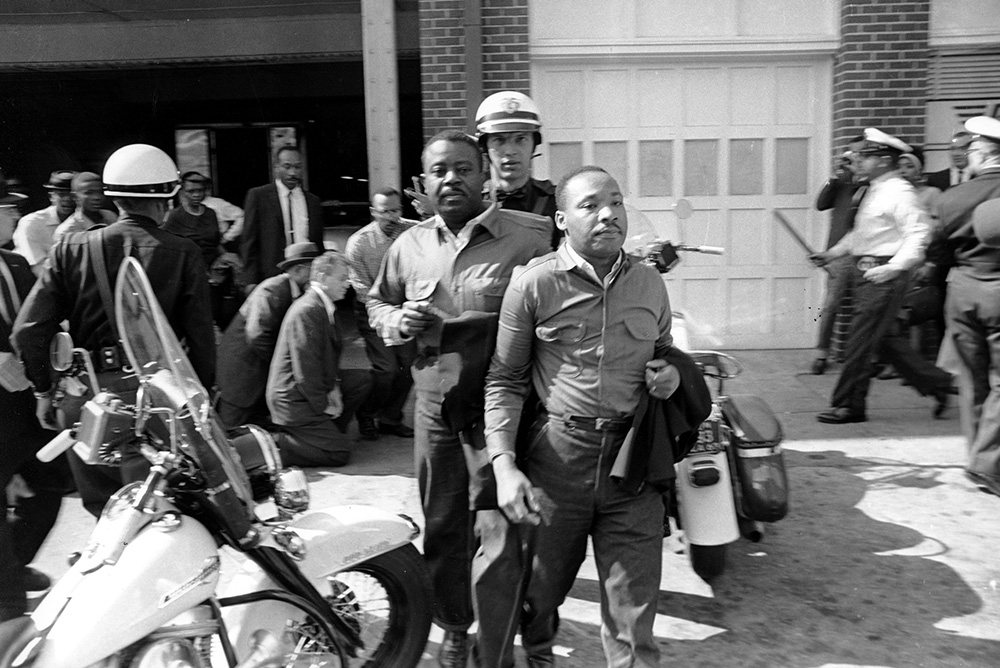
Police arrest the Rev. Martin Luther King Jr. (foreground) and the Rev. Ralph Abernathy at a Civil Rights demonstration in Birmingham, Ala., on April 12, 1963. (AP)
How much do you love me?
Sixty-two years ago, the Rev. Martin Luther King wrote the "Letter from a Birmingham Jail." Responding to criticism by local clergy, he explained that he had led a peaceful demonstration in Birmingham, Alabama, because theirs was the most segregated city in the nation. He told them that "we will have to repent ... not merely for the hateful words and actions ... but for the appalling silence of the good people."
He added, "Human progress never rolls in on wheels of inevitability; it comes through the tireless efforts of [people] willing to be co-workers with God."
King could have been echoing Peter and company, who told the Sanhedrin, "We must obey God rather than human beings."
Peter and Barnabas were in trouble for continuing Christ's mission in spite of "strict orders" to stop. Of course, this happened after the Holy Spirit had so enthralled and emboldened them that they felt impelled to preach about what God was doing through the risen Christ. Their newfound courage even led them to rejoice, not at being freed from jail, but because persecution assured them that they were carrying on Christ's mission.
In 1963, King explained that he intended to "create a crisis" dramatizing the evils of segregation so that they could no longer be ignored. By risking their lives for others, the disciples were dramatizing Jesus' death and resurrection so that people could see concrete evidence of the freedom and new life available in Christ.
As we know all too well, proclamation of Christ led to persecution and martyrdom for people like Sts. Peter, Paul, Perpetua, Felicity, Agnes and their contemporaries — like our own contemporaries King, Medgar Evers, Salvadoran Archbishop Óscar Romero, Notre Dame de Namur Sr. Dorothy Stang and countless others.
What convinced these people that their message mattered more than their life? Our Easter Gospels explain that it happened through a process of encounter, love and mission. Today's Gospel illustrates this process.
John's Gospel describes each detail of the story to reflect events of Jesus' life and/or the current situation of his Christian community. This narrative begins with Peter and six others deciding that the hour had come to return to their fishing trade. Their miraculous catch suggests that fishing was fine, but that Christ offered them much more. Peter's near-naked leap into the sea recalls baptism's immersion and rising anew. Jesus waiting on shore near a charcoal fire evokes the memory of the fire near which Peter denied knowing Jesus. The fish Jesus was preparing were the exact kind that they all had enjoyed at the miraculous sharing of John 6.
Even with the shout of "It is the Lord!" and the inexplicable catch, the disciples remained uncertain. No one dared to ask, "Who are you?" Their wobbly faith was beginning to get stronger.
Advertisement
In the dialogue between Jesus and Peter, Jesus' question, "Do you love me?", serves as both a question and a command. We could interpret Jesus to be saying," I want you to really love me as who I am, not just your idea of me or what I can do for you."
He adds, "If you really love me, you will live in me and I in you and you will care for my people with the same love and courage that I have."
Each time Peter repealed his denials by proclaiming his love, Jesus explained that loving him implied doing what he had done: "Feed my lambs, tend my sheep, feed my sheep." The kind of love Jesus sought was not friendship or admiration, but such a profound union in love that Peter would share his passion for doing the Father's will by giving himself for others.
This evokes the Last Supper discourse when Jesus told his disciples that loving him implied living his command of universal love and his prayer that they would be one in him as he was with the Father (John 13).
This last section of the Gospel of John prompts us to contemplate our own Gospel vocation. Let us call to mind and heart the insights or events that have moved us to express our faith in action, how our work contributes to Christ's mission, and the meaning of our baptism and communion. We express gratitude for how our faith has been strengthened in mission and vice-versa.
Then, with King, we will not forget that the reign of God is not inevitable but depends on the efforts of those who accept the grace of being coworkers with God. That will continually draw us into the mystery of the resurrection.
